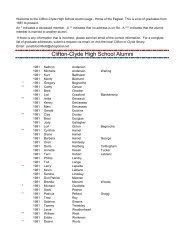E-3 Custodial Interference and Child Abuse
E-3 Custodial Interference and Child Abuse
E-3 Custodial Interference and Child Abuse
Create successful ePaper yourself
Turn your PDF publications into a flip-book with our unique Google optimized e-Paper software.
Kansas Legislator<br />
Briefing Book<br />
2011<br />
<strong>Child</strong>ren <strong>and</strong> Youth<br />
E-3<br />
<strong>Custodial</strong><br />
<strong>Interference</strong> <strong>and</strong><br />
<strong>Child</strong> <strong>Abuse</strong><br />
Other <strong>Child</strong>ren<br />
<strong>and</strong> Youth reports<br />
available<br />
E-1<br />
Tobacco/<strong>Child</strong>ren’s<br />
Initiatives Fund<br />
E-2<br />
Juvenile Justice<br />
Authority<br />
E-4<br />
<strong>Child</strong> Custody<br />
Process/Visitation<br />
E-5<br />
<strong>Child</strong> in Need of<br />
Care Proceedings<br />
<strong>Child</strong>ren <strong>and</strong> Youth<br />
E-3 <strong>Custodial</strong> <strong>Interference</strong> <strong>and</strong> <strong>Child</strong> <strong>Abuse</strong><br />
Current Law<br />
KSA 21-3422 <strong>and</strong> 21-3422a outline the crimes of “interference with<br />
parental custody” <strong>and</strong> “aggravated interference with parental custody.” In<br />
KSA 21-3422, “interference with parental custody” is defined as “leading,<br />
taking, carrying away, decoying, or enticing away any child under the<br />
age of 16 years with the intent to detain or conceal such child from its<br />
parent, guardian, or other person having lawful charge of such child.” An<br />
individual prosecuted for interference with parental custody cannot use<br />
joint custody as a defense. This crime is a class A person misdemeanor if<br />
the perpetrator is a parent entitled to joint custody of the child; in all other<br />
cases it is a severity level 10, person felony.<br />
KSA 21-3422a lists certain circumstances in which the crime<br />
of interference with parental custody will be considered “aggravated,”<br />
including:<br />
●●<br />
●●<br />
Hiring someone to commit the crime of interference<br />
with parental custody; or<br />
The commission of interference with parental<br />
custody, by a person who:<br />
E-6<br />
Changes in <strong>Child</strong><br />
Care Facility<br />
Requirements<br />
○○<br />
○○<br />
Has previously been convicted of<br />
the crime;<br />
Commits the crime for hire;<br />
Lauren Douglass,<br />
Research Analyst<br />
785-296-3181<br />
Lauren.Douglass@klrd.ks.gov<br />
○○<br />
○○<br />
Takes the child outside the state<br />
without the consent of either the<br />
person having custody or the court;<br />
After lawfully taking the child outside<br />
the state while exercising visitation
Kansas Legislative Research Department<br />
rights or parenting time, refuses to return the child at the expiration<br />
of that time;<br />
○○<br />
○○<br />
At the expiration of the exercise of any visitation rights or parenting<br />
time outside the state, refuses to return or impedes the return of the<br />
child; or<br />
Detains or conceals the child in an unknown place, whether inside<br />
or outside the state.<br />
This crime is a severity level 7, person felony.<br />
Minor changes to KSA 21-3422 appear in 2010 HB 2668, the criminal recodification bill, in New<br />
Section 44, which will take effect July 1, 2011. In that bill “interference with parental custody” is defined<br />
as “taking or enticing away any child under the age of 16 years with the intent to detain or conceal<br />
such child from the child’s parent, guardian or other person having the lawful charge of such child.”<br />
The circumstances for aggravated interference with parental custody remain the same although, in the<br />
recodification, the two statutes are combined.<br />
These statutes highlight the fact that if a noncustodial parent believes his or her child needs<br />
protection from the custodial parent, he or she must take action under the Kansas Protection from <strong>Abuse</strong><br />
Act (KPAA), KSA 60-3101, et seq., or the Kansas divorce <strong>and</strong> maintenance statutes, KSA 60-1601, et<br />
seq.<br />
The KPAA allows a “parent of . . . a minor child [to] seek relief under the protection from abuse act<br />
on behalf of the minor child by filing a verified petition with any district judge or with the clerk of the court<br />
alleging abuse by another intimate partner or household member.” If the court is not available, a “verified<br />
petition, accompanied by a proposed order, may be presented to any district judge” who may then grant<br />
emergency relief in an ex parte procedure.<br />
Regardless of whether the court grants an order for emergency relief, the court must hold a hearing<br />
within 20 days of the petition’s filing. Prior to this hearing, the parent who originally filed the petition may<br />
file a motion for temporary relief, to which the court may grant an ex parte temporary order with a finding<br />
of good cause shown. The temporary order remains in effect until the hearing on the petition, at which<br />
time the parent who filed the petition “must prove the allegation of abuse by a preponderance of the<br />
evidence”; the other parent has a right to present evidence on his or her own behalf. At the hearing, the<br />
court has the authority to grant a wide variety of protective orders it believes are necessary to protect<br />
the child from abuse, including awarding temporary custody. The protective order remains in effect for a<br />
maximum of one year but, on motion of the parent who originally filed the petition, may be extended for<br />
one additional year.<br />
The Kansas divorce <strong>and</strong> maintenance statutes allow the court to make a more permanent<br />
modification to any prior custody order. This modification can be made only where a material change of<br />
circumstances is shown, <strong>and</strong> no ex parte order can be issued except in the case that sworn testimony<br />
supports a showing of extraordinary circumstances. Even if an order is issued ex parte, a hearing must be<br />
held within 15 days following a request for a hearing by the party adversely affected by the new order.<br />
E-3 page 2 2011 Legislator Briefing Book
Recent Legislative Proposals<br />
Kansas Legislative Research Department<br />
2007 SB 182 would have amended KSA 21-3422 to allow for a parent to remove a child from the<br />
custodial parent without a prior judicial determination, if there is a “good faith <strong>and</strong> reasonable belief that<br />
such action . . . [is] necessary to protect the child or the parent from being subjected to or threatened with<br />
mistreatment or abuse” as long as the parent “reported the removal to the district or county attorney in<br />
the county in which the child resided” as soon as circumstances allowed. The bill also would have allowed<br />
a parent to assert a defense to a prosecution under KSA 21-3422 if the parent “in good faith reasonably<br />
believed that the action was necessary to protect the defendant or the minor child or both from being<br />
subjected to or threatened with mistreatment or abuse.” The bill would have amended KSA 21-3422a to<br />
include similar provisions. 2007 SB 182 died in committee.<br />
Special Committee on Judiciary 2007 Recommendations<br />
The 2007 Special Committee on Judiciary was directed by the Legislative Coordinating Council<br />
to review the topic of allowing a parent to remove a child from the custodial parent to protect the child<br />
from abuse. S<strong>and</strong>ra Barnett, Executive Director, Kansas Coalition Against Sexual <strong>and</strong> Domestic Violence<br />
(KCSDV), suggested new language for the existing law to cure any problems that such legislation may<br />
create. While the language was drafted with the help of the Attorney General’s Office, it was not endorsed<br />
at that time by the Attorney General. The Attorney General <strong>and</strong> KCSDV later agreed to add language to<br />
create a defense for parents who justifiably removed a child from the custody of another parent.<br />
Ultimately, however, based upon its study, the Committee concluded there had been no evidence<br />
that non-custodial parents were removing children to protect them from an abusive custodial parent. The<br />
consensus of the Committee was that the matter needed further study. It was suggested the interested<br />
groups confer <strong>and</strong> try to reach an agreement on any proposed legislation. The Committee did not propose<br />
any legislation.<br />
For more information, please contact:<br />
Lauren Douglass, Research Analyst<br />
Lauren.Douglass@klrd.ks.gov<br />
Athena Andaya, Principal Analyst<br />
Athena.Andaya@klrd.ks.gov<br />
Kansas Legislative Research Department<br />
300 SW 10th Ave., Room 68-West, Statehouse<br />
Topeka, Kansas 66612<br />
Phone: (785) 296-3181<br />
Fax: (785) 296-3824<br />
2011 Legislator Briefing Book page 3 E-3







